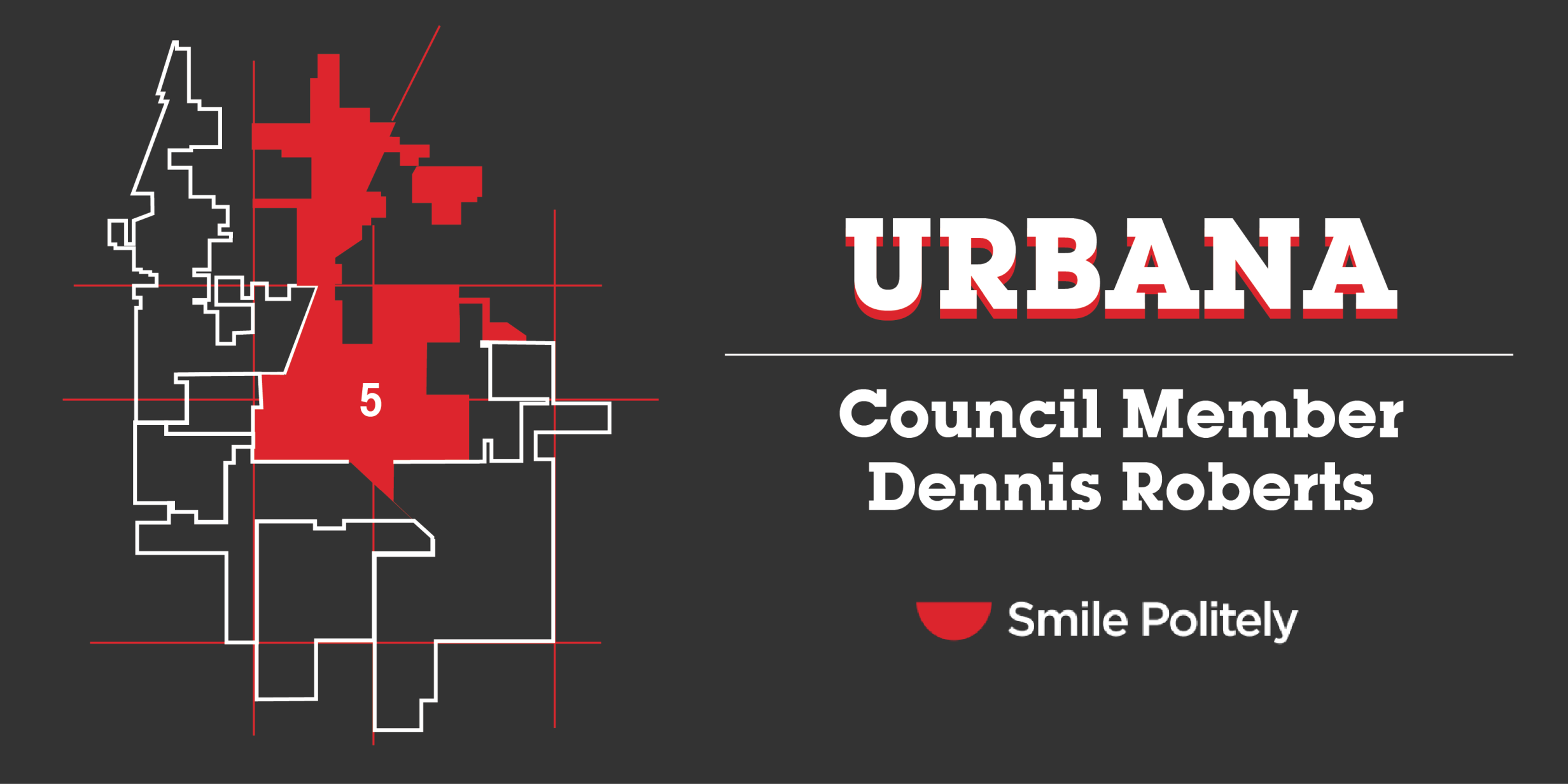Question 1.
Smile Politely: How did you first become involved with city council?
Dennis Roberts: I was part of the group that started the Historic East Urbana Neighborhood Association. It was created in my living room, and I was one of first presidents in 2005. Then, when Laura Huth stepped down from city council to take on the directorship of Habitat for Humanity, there was a need for someone to fill a three-month vacancy. She asked me if I’d be interested, and because I had represented my neighborhood, I said I would take over. Later, I ran for election and prevailed by a couple votes in the primary. I had never really involved in any political activity before. It took a lot of foot-pounding.
Question 2.
SP: What is your professional background?
Roberts: I’m retired now, but my work was in “the guts of publishing” — book design — so jackets, covers, spacing, how to treat an epigraph, and things like that.
I have a B.A. in Art, and most of my work has been in book making. I taught junior high art for two years, but then I moved out west to attend graduate school in the oddest place I could think of that would accept me—Arizona State University in Phoenix. I didn’t finish the program. Instead, I got odd jobs, worked in a printing house, and eventually started working for the University of Arizona press.
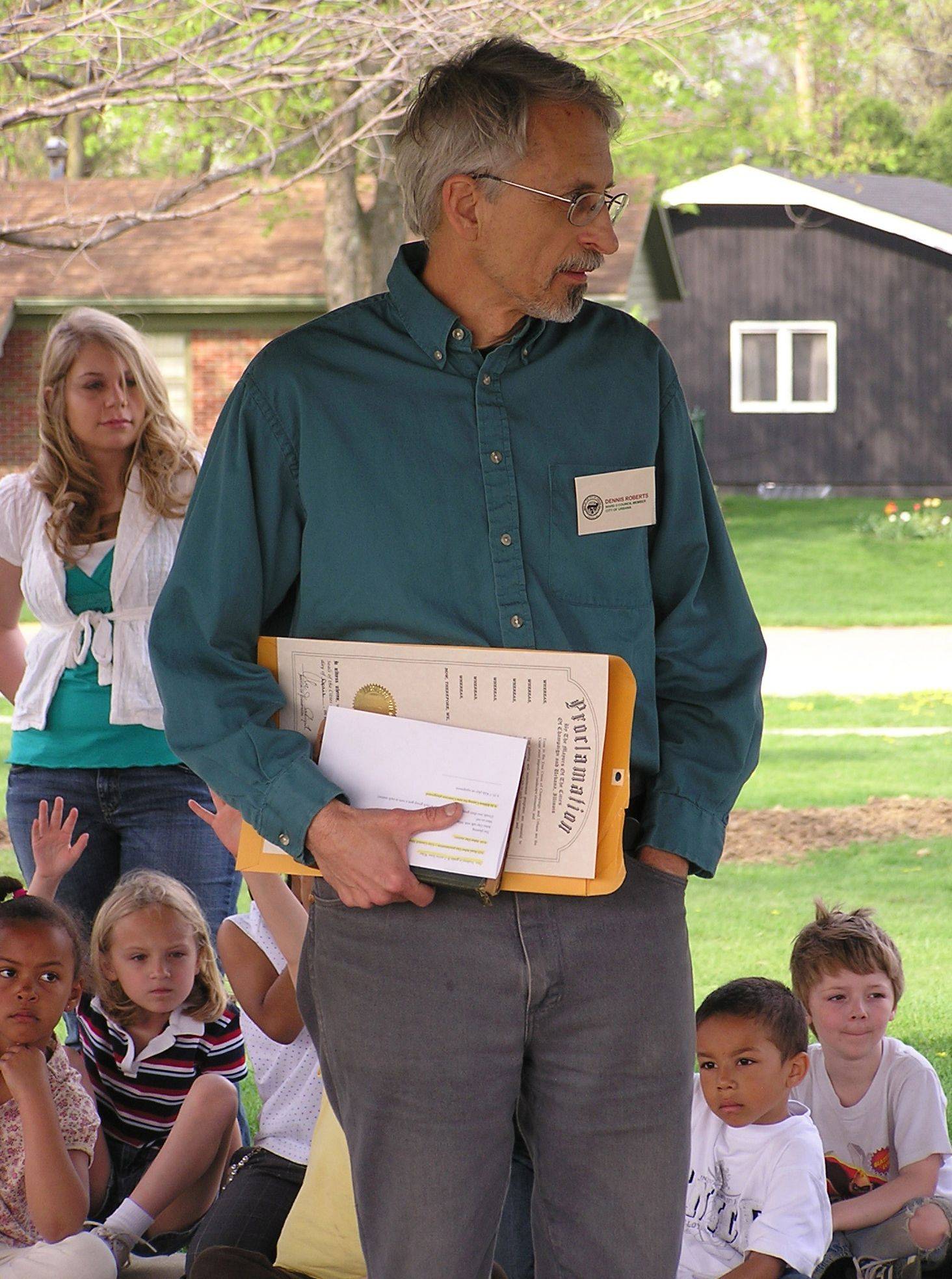
Question 3.
SP: What brought you to Urbana?
Roberts: I arrived here in 1996 to take a job as a book designer for the University of Illinois. Before I left, my previous editor gave me a book called Staying Put [by Scott Russell Sanders]—it’s about staying in a community and having roots there. Urbana came to be the place where I discovered roots. It’s funny, because I used to think about places like Kankakee and think, “why would anyone live there?” But here I am.
Question 4.
SP: What issues have you been most passionate about during your time on council?
Roberts: I am interested in historic preservation work. For instance, I worked with others to create the Joseph W. Royer Arts and Architectural District. Royer was a prominent architect in the area for many years and designed most of the major buildings in Urbana. I would call that one of the underused promotional tools Urbana could use to bring people here.
I also encouraged the mayor to celebrate our 175th anniversary back in 2008. We had a year-long celebration, and we also had a celebration for the 180th anniversary. More recently, I had a significant part in the creation of the Urbana legacy tree program, which just got adopted a year ago.
I’ve also played a big role in Urbana’s Sister City program.
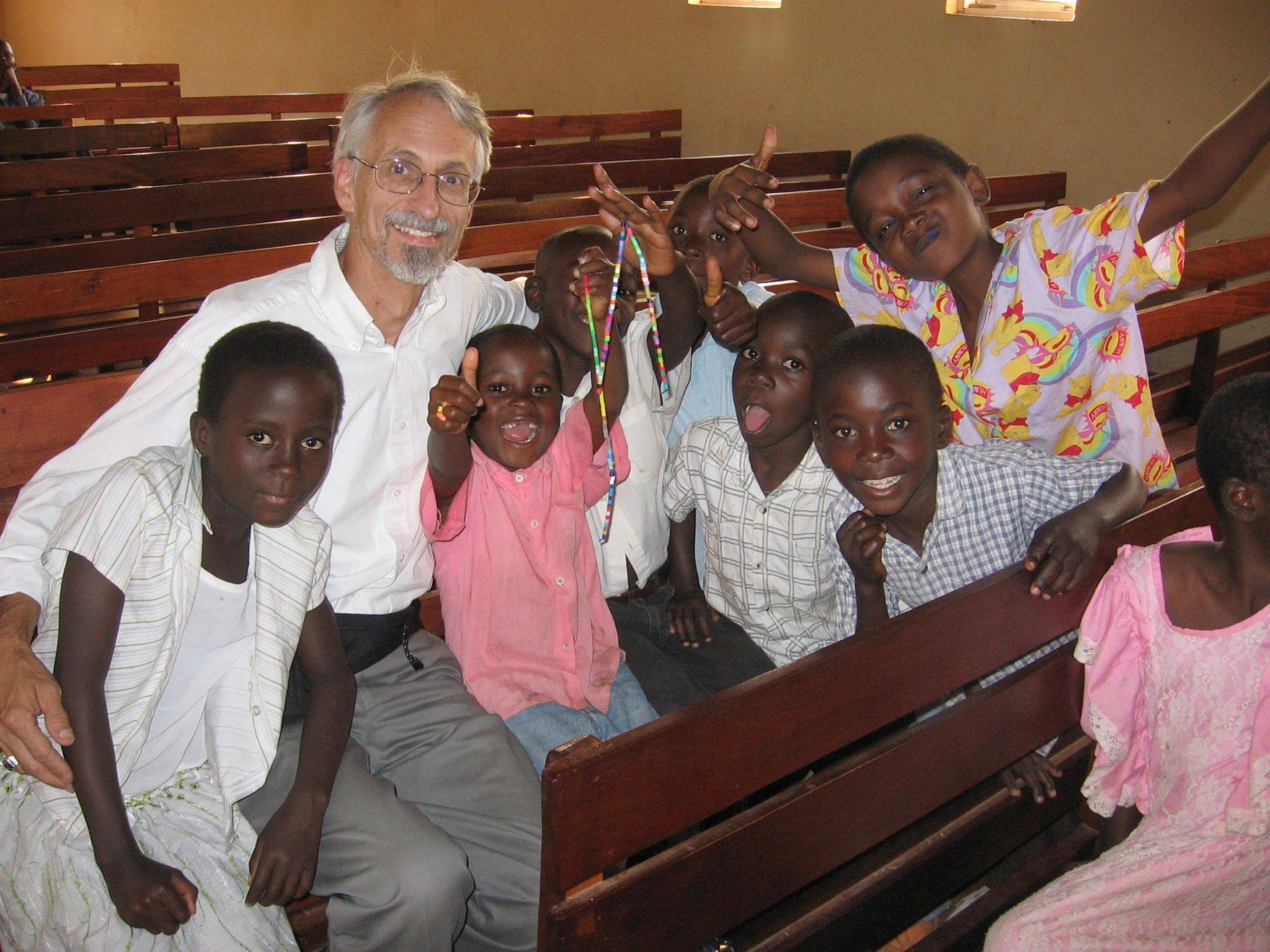
Question 5.
SP: Tell me more about Urbana’s Sister City program.
Roberts: After a trip to Africa, I encouraged Urbana to adopt a city in Malawi as a sister city, and we formed a partnership with Zomba, Malawi.
And then by chance, we had the chance to apply for a significant grant to do work in whatever city we had a significant partnership with. We were awarded the grant and had a $100,000 grant project. We spent 2 ½ years working with the city of Zomba, which allowed me to take three trips to Africa as I monitored the program. The program was about building toilets in primary schools and an ablution block at the hospital for those who have to stay there as they assisted in the caregiving of their loved ones. We did so well in that project that we were invited to apply for a second grant program. It was going to be a tri-lateral grant program with an African city, a US city, and a Chinese city. By luck of fate, our mayor had taken a trip to China and had been approached by a neighborhood association in the Haizhu district of Guangzhou, China. We formalized that association seconds before applying for the grant. We did our first diplomatic trip there in July 2013, and we were then able to work on a solid waste collection and organic composting project in Malawi through a $100,000 grant. These two grants took us 5 years to accomplish.
In 2011, we joined the Illinois Sister City Association, which we didn’t realize existed at first. I’m currently serving as vice president of that organization. In 2012, we were picked as Sister City of the year for the state of Illinois. And then in 2013, because of our project in Malawi, the Urbana Sister City program was award the C-U Humanitarian Relief Award.
We’re now working on a new sister city agreement with Thionville, France. They approached us. They are a small town in northeast France that was liberated by the Third Army under General Patton at the end of WWII, and they have monuments in their town celebrating this. They have wanted to have a US Sister City for quite a few years. One of their leaders taught at the UI law school, and she asked if she could meet the mayor and I. Since that conversation, we’ve sent our first ambassador to France, and they’ve invited us to participate in a celebration. We’re going to send at least one person over there, perhaps a veteran of foreign wars in the Champaign area who served in the Third Army and helped liberate France. We’re hoping to get at least one or two gentleman who served to go over.
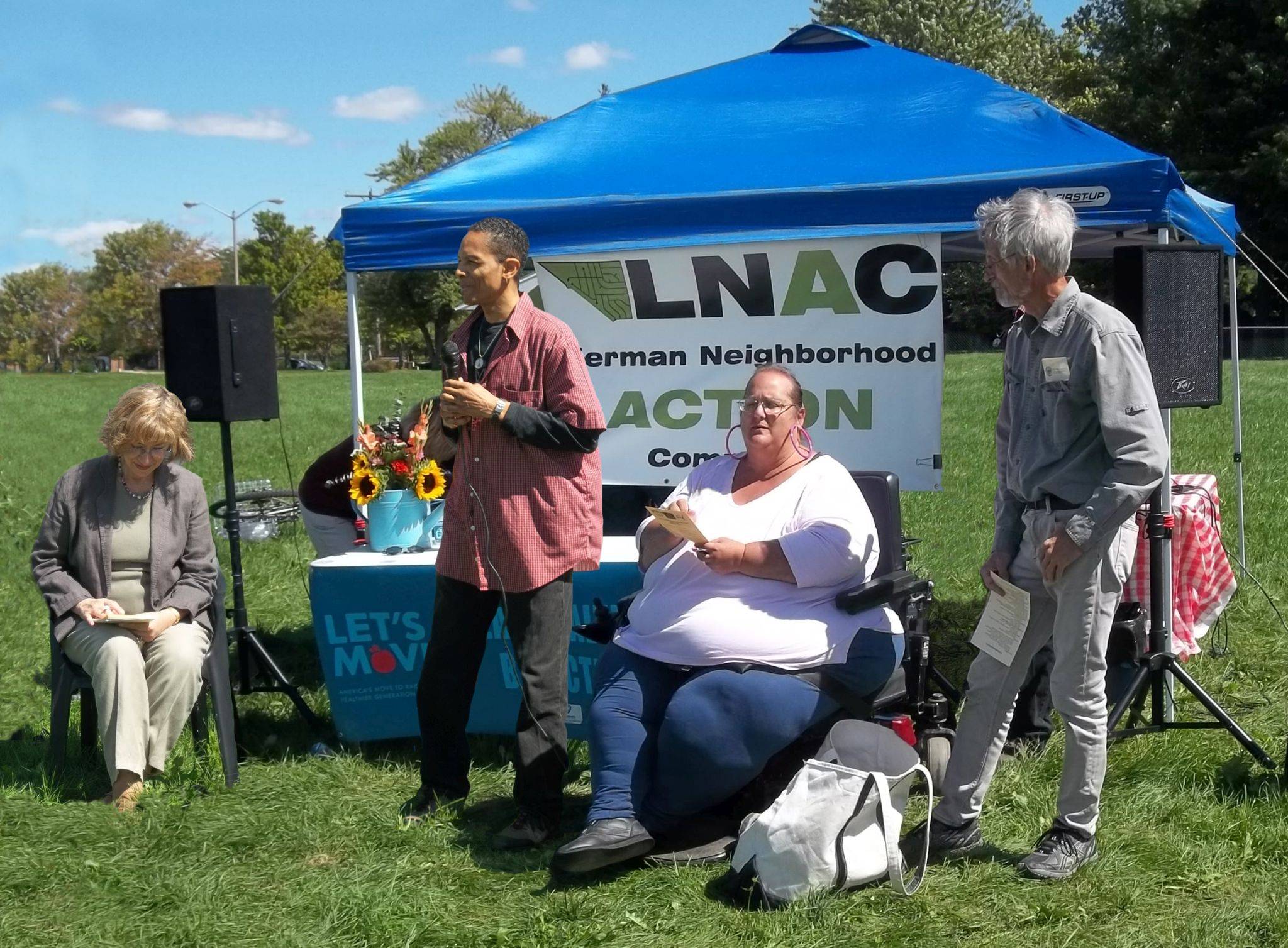
Question 6.
SP: What issue do you think is most important to your ward?
Roberts: About 5 years ago, I held what was perhaps the first serious conversation with residents of the Lierman neighborhood, which at the time was becoming one of the police-called areas of Urbana. That conversation led to the formation of the Lierman Neighborhood Advisory Committee. A few years later, they changed their name to the Lierman Neighborhood Action Committee, and that group has advocated on a lot of wonderful topics that have changed the conversation about who they are—from being the crime center of Urbana to one of the most vibrant, active neighborhoods that has one of the most successful city gardens in the area. The mayor and others have been very supportive of that project, including purchasing land and helping us design the garden with the help of UI student architects. The garden opened two years ago and we’ve had two growing seasons. In one week of harvesting, we collected 86 bags of fresh vegetable groceries that we distributed to 125 families.
Because it’s a low-income and “issue-ridden” corner of Urbana, it has been one of the projects I’ve really advocated for. Diane Martin of Ward 7 has been a wonderful co-worker on that project. She brings her excitement for public nutrition and Michelle Obama’s Let’s Move! Project to the community garden.
Question 7.
SP: What low points have you had on council?
Roberts: I did make one small error. I still hear about this even now, occasionally. I was working on putting streetlights on three streets in east Urbana. They weren’t installed there originally because the mayor of Urbana at the time, in the 1920s, owned the property. We had had a couple break-ins, and some of the folks in that neighborhood asked me to do something. I was able to get a community development grant allocated to get streetlights on the streets in question. And for the same price, I was told I could get more land lighted with modern lights instead of the old globe lights. I went for the modern lights, and since then, people have complained that those streets don’t have the cute, old-fashioned lights that the others do.
Question 8.
SP: What challenges do you think Urbana is facing as a city?
Roberts: Definitely economic development. But fortunately, our mayor is an economist. We all know about the sudden reversal for Urbana in terms of property tax income because of Carle. And home building and development in general has been slow in Urbana. We’ve developed to be a quieter, more thoughtful location with a different personality, and for many people this is a real plus. But our economy is very slow, although I think we have successfully turned around the negative image Urbana used to have when I first joined council.
Question 9.
SP: And how do you think Urbana is doing in terms of economic development?
Roberts: The Urbana Business Association has been doing a good job, and we recently signed a new contract with them with more specific goals. Of course, the Market at the Square has been a huge success; it’s known regionally and actually nationally as an example of a stellar market in a smaller community. But we don’t seem to have been able to form a parallel to the business park that Champaign has, though we have a couple properties in downtown Urbana that are waiting for the right development. The Boneyard development has been going very well, and with the opening of Pizza M, the Colab, and also A+ Lounge, we’re seeing a lot of youthful business owners in Urbana who are almost single-handedly turning around our downtown. What I’ve learned from this is just to be patient—everything comes in time.
Question 10.
SP: How would you characterize the relationship between Urbana and Champaign?
Roberts: The cities have very parallel interests, but because of the personalities, they’re not always able to easily bridge them to gain constructive results. But we’ve done a lot to try to lessen that divide. One of Mayor Prussing’s positions is cooperative involvement. We have a lot of cooperative agreements between Champaign, Urbana, and UI.
Business is the first priority of Champaign and they do a good job of it. The people of Urbana are more community anchored and service oriented. That difference shows up in a lot of quirky ways as issues come up in the communities. For instance, Urbana is potentially going to have three Sister Cities, but in Champaign they said they couldn’t find any interest for Sister Cities on the city council. To me it’s a no brainer that you’d want that kind of international fellowship, but the stars didn’t align for Champaign.
Question 11.
SP: What are your views on UC2B’s recent partnership with iTV3?
Roberts: The hope for results that we all had originally was that it would become an independent entity that the city would own and operate. But the reality was that it’s too difficult, and the city doesn’t have enough money to do it. So we’ve had to work with a commercial company in partnership. We still have a lot of controlling interest in the UC2B contract that we’ve negotiated. Takes responsibility off the shoulders of our city and community was the realistic thing to do. At least it’s a company with strong local ties. And in a couple years, if we think it’s not working, we can always change direction.
Question 12.
SP: Can you comment on the amount Urbana spends on outside legal council, which has recently received attention from the News-Gazette?
Roberts: Unfortunately, when you get sued, you have to respond. People say, well, should we ever have been sued in the first place. The city’s position is proving to be valid and have merit. The city council supports the legal process we’re involved in. Cities get sued for all kinds of things—every city will be involved in some legal action. So I support the mayor.
Question 13.
SP: What are your views on concealed carry?
Roberts: I’m totally against carrying guns generally. In terms of carrying them around concealed, I have yet to see any good data that shows being armed has protected someone’s life to a degree that would offset the number of times people have shot others and killed people.
Question 14.
SP: Would you change how Urbana City Council operates, and if so, how?
Roberts: No. I think it’s a really effective way of governing. It gives people a real chance to advocate if they wish. I like the idea of the mayor being more in charge of the direction of the city. Sometimes I’m more interested in certain topics than she is, which can be frustrating, but everyone has their own unique slant on things.
I do wish the city as a whole would take what I see as the value of historic preservation more seriously. I’ve seen it used in other towns as a downtown enhancement and revitalization tool, and I think no one gets how that could work here very well. I feel like I’m always talking to a patient but tired audience.
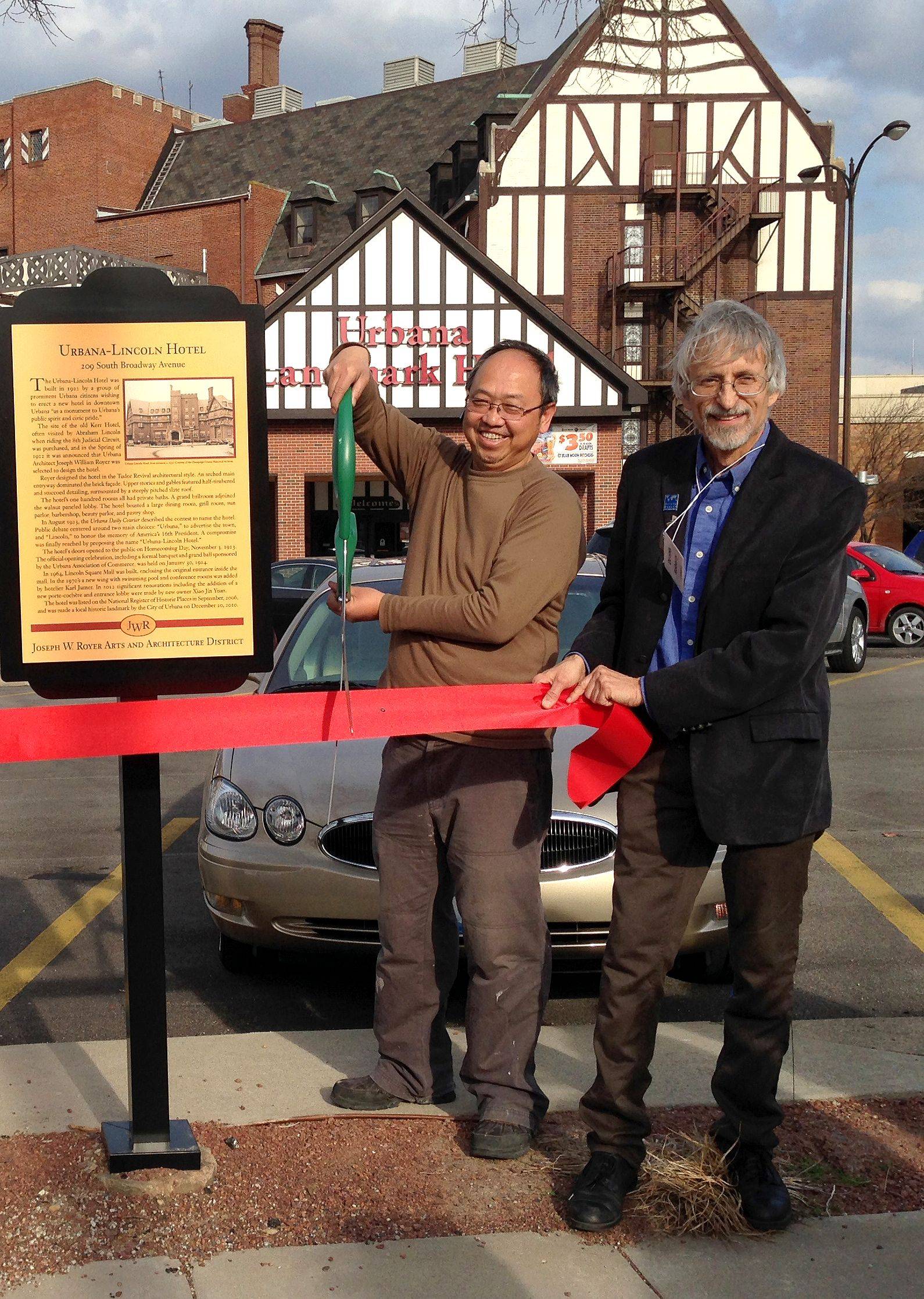
Question 15.
SP: What businesses or public spaces in Urbana do you really enjoy?
Roberts: The destination of choice for downtown Urbana is the public library. And recently, they celebrated their 140th birthday. We have a brand new and wonderful library director.
And then the Urbana Landmark Hotel. The money for it was very controversial, but it’s been a huge success, perhaps not to the degree we hoped, but it’s an important keystone of downtown.
And, of course, Boneyard Creek.








